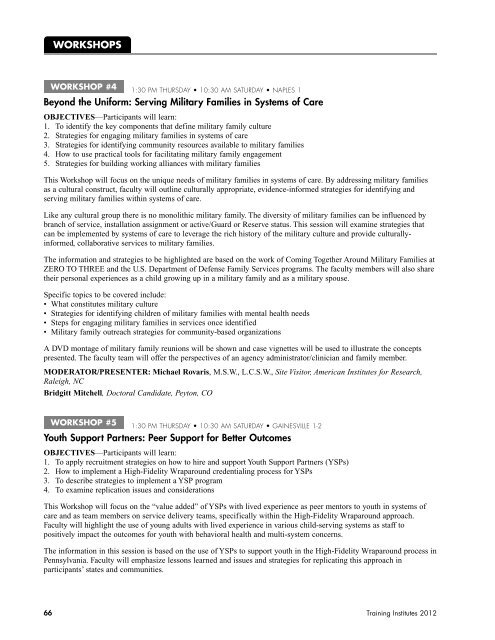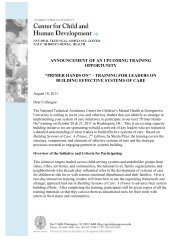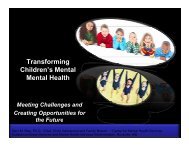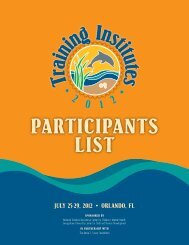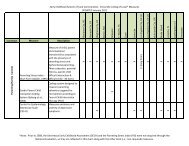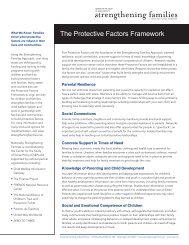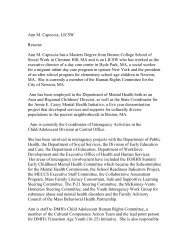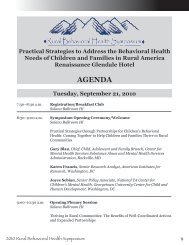Training Institutes 2012 - National Technical Assistance Center for ...
Training Institutes 2012 - National Technical Assistance Center for ...
Training Institutes 2012 - National Technical Assistance Center for ...
You also want an ePaper? Increase the reach of your titles
YUMPU automatically turns print PDFs into web optimized ePapers that Google loves.
WORKSHOPS<br />
WORKSHOP #4 1:30 PM THURSDAY • 10:30 AM SATURDAY • NAPLES 1<br />
Beyond the Uni<strong>for</strong>m: Serving Military Families in Systems of Care<br />
OBJECTIVES—Participants will learn:<br />
1. To identify the key components that define military family culture<br />
2. Strategies <strong>for</strong> engaging military families in systems of care<br />
3. Strategies <strong>for</strong> identifying community resources available to military families<br />
4. How to use practical tools <strong>for</strong> facilitating military family engagement<br />
5. Strategies <strong>for</strong> building working alliances with military families<br />
This Workshop will focus on the unique needs of military families in systems of care. By addressing military families<br />
as a cultural construct, faculty will outline culturally appropriate, evidence-in<strong>for</strong>med strategies <strong>for</strong> identifying and<br />
serving military families within systems of care.<br />
Like any cultural group there is no monolithic military family. The diversity of military families can be influenced by<br />
branch of service, installation assignment or active/Guard or Reserve status. This session will examine strategies that<br />
can be implemented by systems of care to leverage the rich history of the military culture and provide culturallyin<strong>for</strong>med,<br />
collaborative services to military families.<br />
The in<strong>for</strong>mation and strategies to be highlighted are based on the work of Coming Together Around Military Families at<br />
ZERO TO THREE and the U.S. Department of Defense Family Services programs. The faculty members will also share<br />
their personal experiences as a child growing up in a military family and as a military spouse.<br />
Specific topics to be covered include:<br />
• What constitutes military culture<br />
• Strategies <strong>for</strong> identifying children of military families with mental health needs<br />
• Steps <strong>for</strong> engaging military families in services once identified<br />
• Military family outreach strategies <strong>for</strong> community-based organizations<br />
A DVD montage of military family reunions will be shown and case vignettes will be used to illustrate the concepts<br />
presented. The faculty team will offer the perspectives of an agency administrator/clinician and family member.<br />
MODERATOR/PRESENTER: Michael Rovaris, M.S.W., L.C.S.W., Site Visitor, American <strong>Institutes</strong> <strong>for</strong> Research,<br />
Raleigh, NC<br />
Bridgitt Mitchell, Doctoral Candidate, Peyton, CO<br />
WORKSHOP #5 1:30 PM THURSDAY • 10:30 AM SATURDAY • GAINESVILLE 1-2<br />
Youth Support Partners: Peer Support <strong>for</strong> Better Outcomes<br />
OBJECTIVES—Participants will learn:<br />
1. To apply recruitment strategies on how to hire and support Youth Support Partners (YSPs)<br />
2. How to implement a High-Fidelity Wraparound credentialing process <strong>for</strong> YSPs<br />
3. To describe strategies to implement a YSP program<br />
4. To examine replication issues and considerations<br />
This Workshop will focus on the “value added” of YSPs with lived experience as peer mentors to youth in systems of<br />
care and as team members on service delivery teams, specifically within the High-Fidelity Wraparound approach.<br />
Faculty will highlight the use of young adults with lived experience in various child-serving systems as staff to<br />
positively impact the outcomes <strong>for</strong> youth with behavioral health and multi-system concerns.<br />
The in<strong>for</strong>mation in this session is based on the use of YSPs to support youth in the High-Fidelity Wraparound process in<br />
Pennsylvania. Faculty will emphasize lessons learned and issues and strategies <strong>for</strong> replicating this approach in<br />
participants’ states and communities.<br />
66 <strong>Training</strong> <strong>Institutes</strong> <strong>2012</strong>


